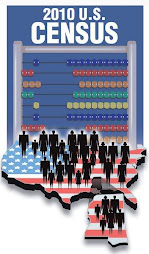From WTOK:
Could Mississippi lose another seat in Congress? Mississippi Sen. Roger Wicker said it's a possibility.
Speaking to reporters in the state Thursday, Wicker said statistics from the 2000 Census showed states like California counted illegal immigrants as citizens. He said it could happen again, with even more illegal immigration during the past decade.
"When it comes to reapportionment of our Congressional seats, when it comes to deciding how the electoral college is going to be allocated, how many seats Mississippi will have in the House of Representatives, how many votes we will have in the presidential election every four years, we need to count citizens and citizens only," said Wicker.
Mississippi, Indiana, and Michigan lost a seat in Congress based on the 2000 Census.
Wicker is supporting a Senate amendment to add the question, "Are you a U.S. citizen?" to census forms that will go out in March 2010.
Wicker's press statement:
For Release Week of November 2, 2009
Contact: Jordan Stoick - (202) 224-6253
Report From Congress
By Senator Roger F. Wicker
WICKER: LACK OF CITIZENSHIP QUESTION ON CENSUS COULD HURT MISSISSIPPI
Senator Says Illegal Immigrants Elsewhere Could Cost State Funding, Congressional Representation
Many Mississippians are aware of next year's census, though few realize its results could have a negative impact on our state. Because of high concentrations of illegal immigrants in other states, Mississippi is at risk of losing a lot, including federal funding and one of our four seats in the U.S. House of Representatives.
This would not be the first time our state has been impacted negatively by the number of non-citizens living elsewhere in the country. Following the 2000 census, Mississippi went from five seats to four in the House of Representatives. The Center for Immigration Studies stated in a 2003 report that this loss was due to the counting of illegal immigrants elsewhere in the country during the last census.
Our Constitution requires a census be taken every 10 years to decide how the 435 seats of the House will be divided. The seats are split among all states in proportion to their population, meaning that if non-citizens are counted toward apportionment, a state with a high number of illegal immigrants stands to receive greater congressional representation than a state with fewer non-citizens.
States with a high number of non-citizens would also be given greater influence in presidential elections, as the Electoral College system is based on the size of a state's congressional delegation. The numbers collected from the census are also used to decide the annual distribution of approximately $400 billion in federal funding, which means critical funding to states and localities goes disproportionately to those areas with more non-citizen residents.
CITIZENSHIP QUESTION NEEDED
In order to get an accurate snapshot of our nation's population and demographic makeup, I believe next year's census should count everyone. However, I do not believe that illegal immigrants and other non-citizens should be considered when deciding how congressional seats and federal funding are divided amongst the states. The only way we can make this critical distinction is if the census asks a question about citizenship. Unfortunately, in its current form, next year's 10-question census does not do so.
I support an effort currently underway in Congress to add the question of citizenship to next year's census. The push, being led by Senators David Vitter of Louisiana and Robert Bennett of Utah, represents a common sense approach that would provide the information needed to restore confidence in how our census data is used.
Recent data from the U.S. Census Bureau shows there are 298 million people currently living in the U.S., a number that includes 21 million non-citizens. According to Numbers USA, including illegal immigrants and non-citizens in the reapportionment process would have a huge impact in how House seats are divided. The group states: "Counting only U.S. citizens would result in [House] districts with approximately 635,000 people, whereby counting all individuals regardless of citizenship would create districts with more than 685,000. Therefore, the state of California that has 5.7 million non-citizen residents could gain five or more seats in the House."
Many estimates show that states with high numbers of illegal immigrants - like California, Nevada, Texas, and New York - stand to gain after next year's census. These potential gains would likely come at the expense of a handful of other states without high populations of illegals. In addition to Mississippi, Louisiana also falls in this category, meaning two states still working to recover from the worst natural disaster to hit our country are vulnerable to losing critical federal funding and representation in Congress.
COMMON SENSE REFORM
Opponents of the plan to add a citizenship question to next year's census claim that it would be too costly to reprint forms and that there is not enough time to do so before the count takes place next spring. I disagree and believe it is too important to wait another ten years before addressing this issue. As James Gill, a columnist with the New Orleans Times Picayune, said, "Only a government bureaucrat could claim that adding one simple question could cause such havoc and take so long." He added, "It shouldn't take months to figure out how to ask whether respondents are citizens of this country."
It is unfair for Mississippi or any other state to be forced to cede influence and federal representation to other states that have high non-citizen populations, particularly those that harbor illegal immigrants. We experienced this after the 2000 census, and we should not allow it to happen again.
Subscribe to:
Post Comments (Atom)

No comments:
Post a Comment